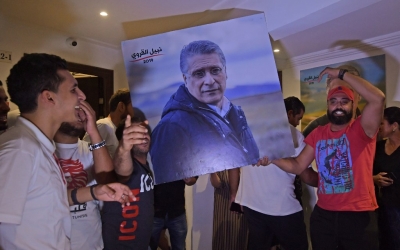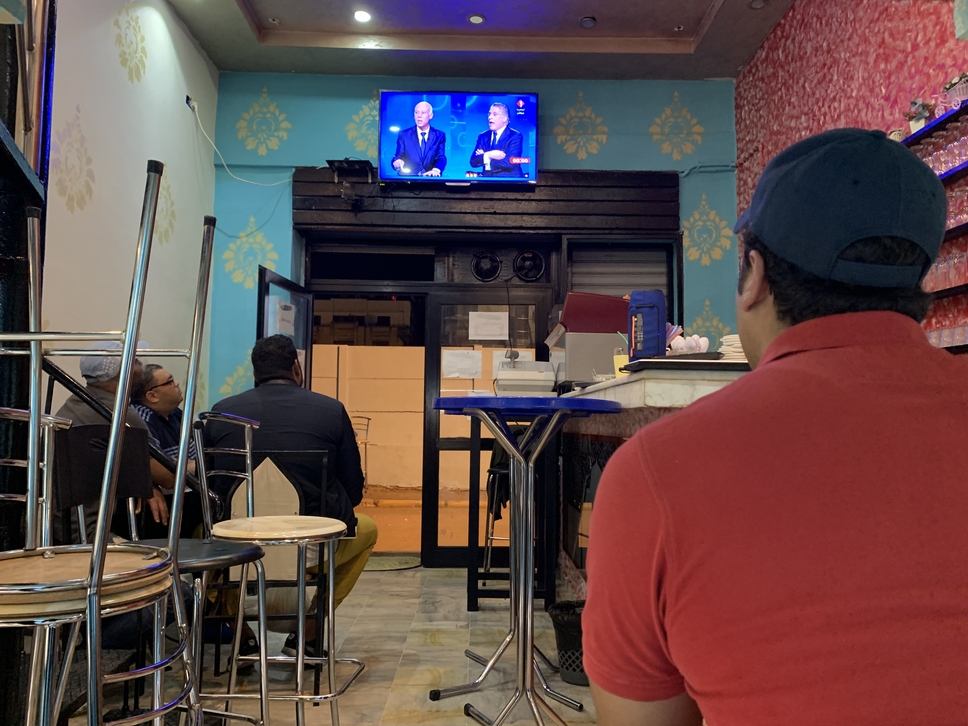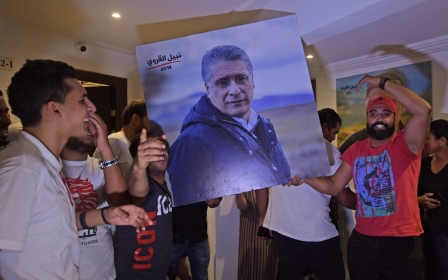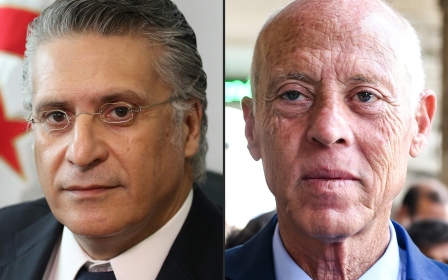The professor vs the media tycoon: Tunisia’s presidential candidates square off in final TV debate
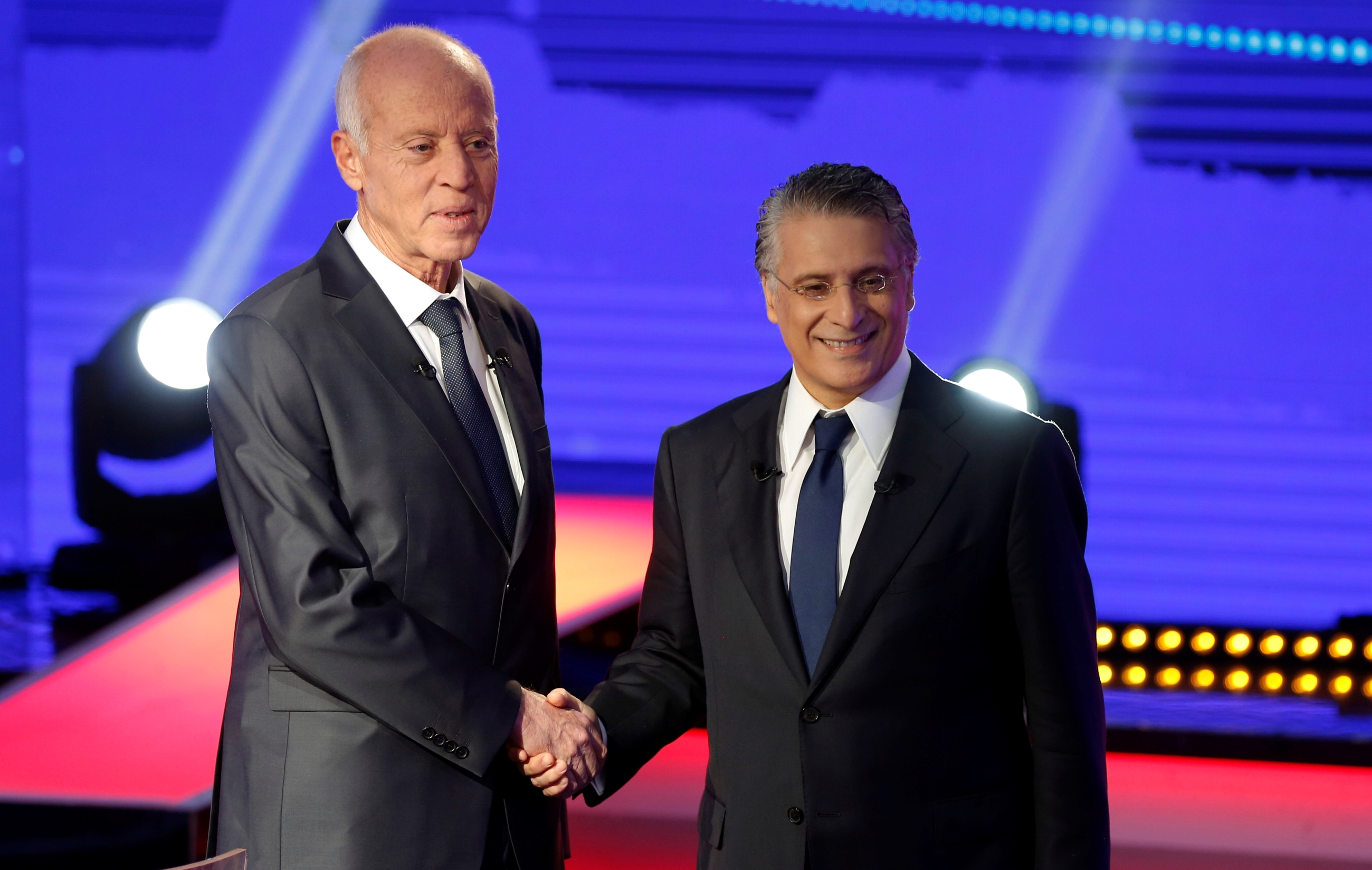
Two political newcomers have squared off in a long-anticipated presidential debate, less than 48 hours before Tunisians head to the polls in the country’s second free and fair election.
Kais Saied, a retired constitutional law professor with an awkward public manner, faced-off against Nabil Karoui, a media tycoon who has drawn comparisons to Silvio Berlusconi and Donald Trump.
Both men secured shock wins in last month’s first-round vote, with Saied, 61, coming first in the poll with 18.4 percent of the vote while Karoui, 56, secured 15.6 percent.
Established political parties fell far short of the two populists, underscoring a sharp rejection by most Tunisians of the country’s political establishment.
“If I am elected president, all officials will be held accountable for their mistakes, including myself,” Saied said at Friday’s debate.
New MEE newsletter: Jerusalem Dispatch
Sign up to get the latest insights and analysis on Israel-Palestine, alongside Turkey Unpacked and other MEE newsletters
The academic, speaking in a classical form of Arabic not practiced by most Tunisians, presented robust economic, domestic and foreign policies during the two-hour-debate, such as a desire to end the war in neighbouring Libya.
Saied called on foreign powers which had supported rival groups to end their involvement in the North African country and “withdraw their hands”.
He also issued a sharp rebuke of politicians who proposed normalising ties with Israel and vowed to clamp down on media organisations that produced pro-Israeli content - declaring the practice “high treason”.
Karoui, who was dramatically released from prison on Wednesday night, avoided entering into a direct confrontation with Saied during the event and instead used the platform to issue generic statements.
His performance was largely criticised on social media, partly because at several points he appeared to fumble his words. He was also accused of drawing down a timer which limits both candidates’ answers to 90 seconds.
When confronted by one of the questioners on his reported ties with an Israeli lobbyist, an allegation that has threatened to imperil his campaign, Karoui issued a short statement denying any involvement.
Ari Ben-Menashe, a former Israeli intelligence officer, was reportedly paid $1 million by Karoui’s campaign team to lobby foreign powers such as the US and Russia.
“I have nothing to do with the Israeli intelligence man who claimed to receive money from me,” he said.
‘Shakes things up’
Karoui has been mired in controversy since he announced his run for the presidency in early August and is currently facing charges of money laundering and tax fraud, allegations he vehemently denies.
Constitutional experts have said it is unclear what will happen if he wins the 13 October poll and is then found guilty of the charges.
They say they can’t guarantee that he will qualify for presidential immunity for crimes committed before the vote.
“For observers, Sunday’s run-off elections had been all but determined: Kais Saied had secured several endorsements and his victory was almost certain,” Sharan Grewal, a research fellow at the Brookings Institution, told Middle East Eye.
“But Karoui’s release shakes things up. His release could give him a boost at the polls, and may also lead other politicians to be more willing to endorse him.”
Both candidates have had the economy at the heart of their campaign, realising that poverty and unemployment were the main factors that triggered the 2011 revolution.
Saied went door-to-door to speak directly with voters and shunned billboards, television ads, and flashy campaign concerts.
Meanwhile, Karoui's hugely popular Nessma TV station spent the last few weeks broadcasting stories critical of the government while promoting his philanthropy among poor Tunisians.
‘What difference will they make?’
At the Tranquila cafe in downtown Lafayette, large groups of men sat outside playing cards and smoking as nearly all the TV screens opted to broadcast the Euro 2020 qualifier between Iceland and France.
However, at one table of four, all eyes were fixed on a TV that was showing the debate.
Hassan Mohammed, 33, said while he respected both men, he had lost all belief that an election would change his life for the better.
“What changes can either of them make? Unemployment is high, salaries are low and the cost of living keeps skyrocketing,” he said.
According to the World Bank, Tunisia’s public debt amounts to more than 70 percent of economic output, a significant increase compared with the pre-revolution level of 40 percent.
Unemployment has also risen from 12 percent before the uprising to 15 percent today and reaches 40 percent in some cities.
“Unless they revolutionise the political system and root out these corrupt politicians - these locusts - nothing will change for us,” Mohammed said.
Although the role of president in Tunisia has fewer powers than that of a prime minister, the post carries wide political influence.
The prime minister, who forms a government and manages most portfolios, will be picked by parliament following last Sunday’s legislative elections.
Tunisia’s moderate Islamist party, Ennahdha, came first in that vote, while Karoui’s newly formed Qalb Tounes came second.
Ennahdha secured 52 seats, while Qalb Tounes managed to get 38. Nidaa Tounes, formerly the main centrist party, won only three, down from 86 in 2014, while Tahya Tounes, led by Prime Minister Yousef Chahed, managed 14 seats.
‘Improbable compromises can happen’
Analysts have said they expect several weeks of tense political negotiations as both Ennahdha and Qalb Tounes will try to curry influence with smaller parties and independents to enter into a coalition.
“The formation will be difficult without any doubt, but Tunisia has shown in the past that it is willing to make improbable compromises happen,” Henrik Meyer, the resident director of German political foundation - Friedrich-Ebert-Stiftung, told MEE.
Alya Khemakhem, a PhD student at the University of Southern California, agreed, telling MEE that a settlement could be reached after the elections.
“The parties are adopting a ‘we will not form coalitions’ strategy since the electoral process is still ongoing. It’s worth noting that it's not in their best interest to openly claim that they're willing to bargain with each other.
“Realistically speaking, they will form coalitions if they want to pass certain policies.”
Middle East Eye delivers independent and unrivalled coverage and analysis of the Middle East, North Africa and beyond. To learn more about republishing this content and the associated fees, please fill out this form. More about MEE can be found here.


